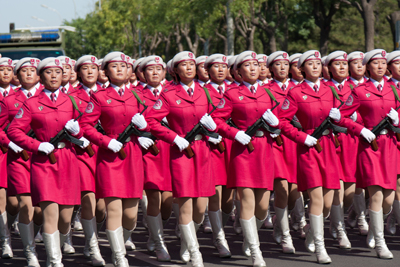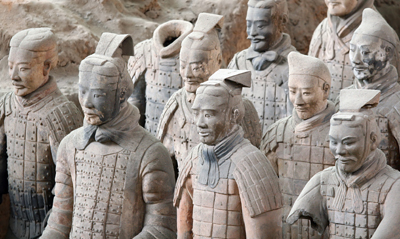
|

|
When I was growing up, I remember a tee shirt with the motto: “Be Reasonable, Do It My Way.” As with most such shirts, the intention was to be amusingly ironic. But I find it amazing that many people, especially in the realms of politics and economics today, actually think like this. No, not that they would ever voice this motto, because formulating this thought aloud in words would show them how fatuous is this idea compliant control. But still, it lurks there in the back of their minds: “I’m right, you’re wrong, we’ll all get along when you just shut up, listen to me, and obey.”
For the person who unconsciously subscribes to this tee-shirt motto—or who can look at it, read it aloud, and still fail to find the irony—the people around them must be something other than real, live, self-actuating, independent, and strong-minded human beings. Maybe the subscribers believe they are surrounded by a species of fleshy ghosts, or puppets, stick figures, and imaginary characters, like those in a book or play. For the subscribers, other human beings may have faces and voices, but their thoughts, their reactions, and the words that come out of their mouths are somehow unrelated to reality. For the people who believe Their Way is the Only Way, the intentions, opinions, aspirations, and desires of other people are simply unimportant, fictitious, or wrong—on the order of “You can’t really believe that, can you?”
We live in a world of varied opinions. Freedom of thought and action is not just an abstract idea, to be written somewhere on a dusty parchment and forgotten when convenient. The human ability to approach ideas, propositions, and profound beliefs as intellectual objects, to dissect them, to weigh the evidence for and against each side, to reach a conclusion, and then act on it … this is all a function of each human being’s having a unique brain inside a physically separate body. Perhaps all protozoans exhibit common reactions to their environment, based strictly on their genetic code and the interactions of their internal proteins. Perhaps all fish, frogs, and reptiles are predictable in their behaviors, based on the primitive structures of their vertebrate hindbrains. But when you get into the class Mammalia, where the brain starts developing different lobes and functions, learns from its environment, and can overcome its reactions, all bets are off and groupthink becomes a relic of the distant past. Even dogs have different personalities and operate with their own senses and ideas.
Yes, there have been societies with monolithic social and political structures: Nazi Germany, Soviet Russia, Maoist China, and North Korea under the Kim regime. We are all familiar with their rallies and parades, with row after row of soldiers marching in step, usually followed by military vehicles which, lately, are towing intercontinental missiles.1 You can look at the newsreels and the pictures and think that everyone in these societies must think the same: ants with jackboots and armbands. But note also that every one of these societies has an active bureau of secret police and—somewhere out in the country, away from the cities—a growing population of political dissidents in labor camps.
So, the people who march in step and who stand out in the sunshine with their arms raised—that is, the members of these societies who don’t go into the labor camps—do they all really think alike? Are the mottos of the national party and the image and words of the dear leader really engraved on their hearts? While it’s not possible—not yet, thank God—to open a person’s skull and examine his or her brain from the outside to see the content of its innermost thoughts, I believe that even there we would find a diverse mix of ideas, intentions, and reactions. Some people actually believe the party mottos and the leader’s words because they have heard the arguments, weighed them to the best of their abilities, and agree with them. Some believe because the arguments are easy to understand and affirm, and the person—for a variety of reasons—doesn’t think or care much about politics or economics, or the greater questions to which political and economic thought applies. Some believe that by saying the words and mimicking belief in them they can be part of the larger thing that is moving through their lives whether they want it or not. Some smaller fraction of this group believes that if they say the words loudly enough and show other signs of commitment and support they can get ahead in their job or their living situation—that they can climb on the back of the beast, ride it, and perhaps one day even be allowed to take the reins. And others believe that the beast is here, is a fact of life whether they want it or not, and the course of greatest safety for themselves and their family is to pretend to show it their support.
Even in the heads of the jackbooted soldiers marching down the street—aside from immediate concerns about missing a step, scuffing the shine on their boots, or being caught with their uniform in some other kind of disorder—you would find this diversity of beliefs and expectations.
Even in the social dimensions where belief is the basis of a group of people coming together in the first place, you will find that they all have different ideas and opinions. From the simple words of a carpenter and later a rabbi who lived two thousand years ago, how many varieties of Christianity have spawned, encountered schisms, and split over issues like the nature of the godhead, the nature of sin and right and wrong, the meaning of the words as they are written in the texts, and even the substantial nature of bread and wine? Even a supposedly monolithic religion like Islam, which adheres to the words of a single man exactly as they were written down from his lips, has split into factions over the rights of his successors, the importance and interpretation of certain passages above others, and the proper form of obedience. Even the simple and direct message of the Buddha has generated two versions of the proper way to observe and follow it, plus cultural variations in every land that has adopted Buddhism. Religions like Christianity and Islam will often act or react in a monolithic fashion when expanding into new territories or confronting outside opposition, but all the while their adherents are thinking, interpreting, adopting, and preparing to set up another sect or create a new schism.
People cannot help but have different ideas. In every land, in every generation, the restless human mind examines, interprets, adapts, and sometimes discards the thoughts and beliefs, patterns and traditions that wash across groups of people like the waves in an ocean. In reality, most people cannot hold a single belief or thought in their heads for all of their lives. Most groups larger than an extended family or small tribe cannot remain cohesive for longer than a generation—and some not even until the next election.
Whether a person believes in and cares deeply for a political or economic proposition or tradition; or follows it only because mother, father, or a teacher once voiced it and the person him- or herself really doesn’t care; or follows it because his or her neighbors are suspicious, will whisper among themselves, and will one day turn the person into the secret police … various societies tend to build up standing waves of belief and tradition that in turn will engender consolidated political and economic actions. Societies in this state of temporary conformity, at the crest of the passing wave, will sometimes try to spread their rigid social, political, or economic order to other groups and countries. And then, in an excess of enthusiasm, war will break out, soldiers will be enlisted for fighting and killing instead of just marching, and human beings will endure the results in terror and misery.
When will the world come together in harmony? When will the various religious sects recognize that their functional similarities outweigh their doctrinal differences and join together in uniformity? When will all of the Earth’s nations agree on a single political or economic principle and a social order that is not tainted by the interpretations and cultural characteristics of one group or another? When will they put off their differences and give up their quarrels? When will the wars end?
Only when we can put off our restless human mind, stop thinking and examining the propositions of everyday life, and become something more like fleshy ghosts or stick figures than active, thinking human beings … That is, never.
1. I find it telling that the Western democracies, which allow wide latitude for political and religious dissent, don’t hold these monolithic rallies and military parades. When was the last time you saw members of the military services marching in lockstep down Pennsylvania Avenue? Not on the Fourth of July: our national parades are a time for high-school marching bands, costumed dance troupes, veterans groups, and balloons. The active-duty military only come together and march in step to honor a fallen president.
No comments:
Post a Comment